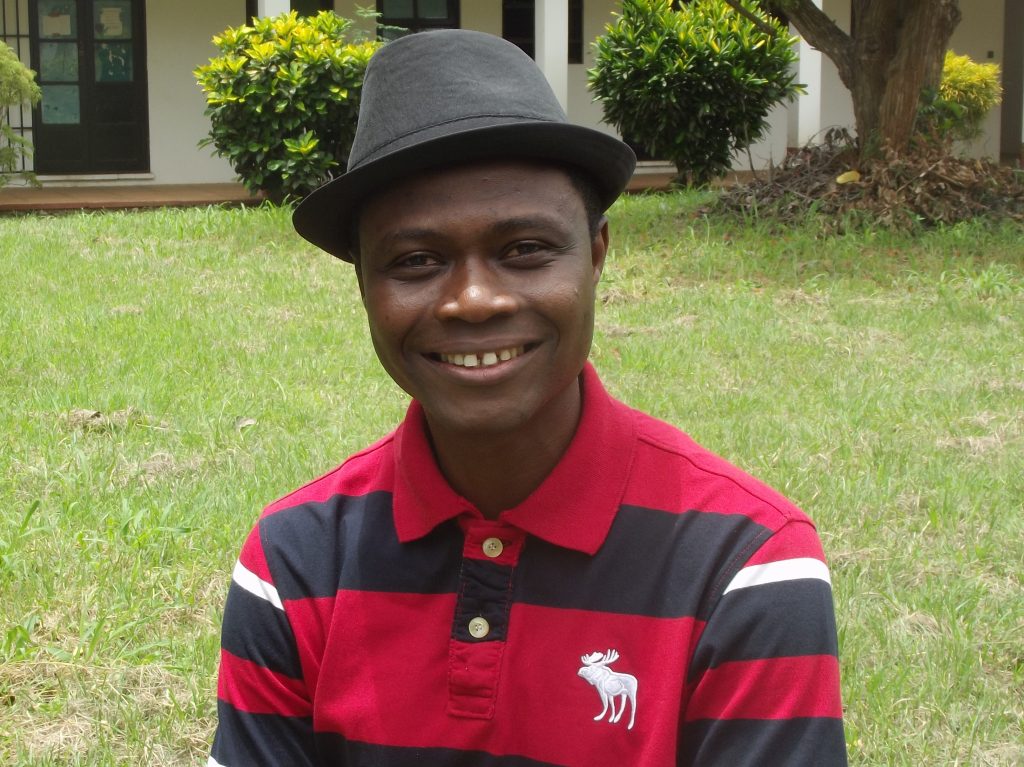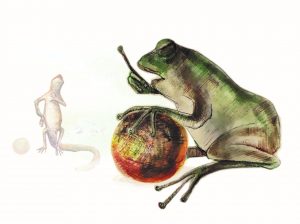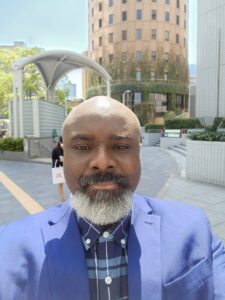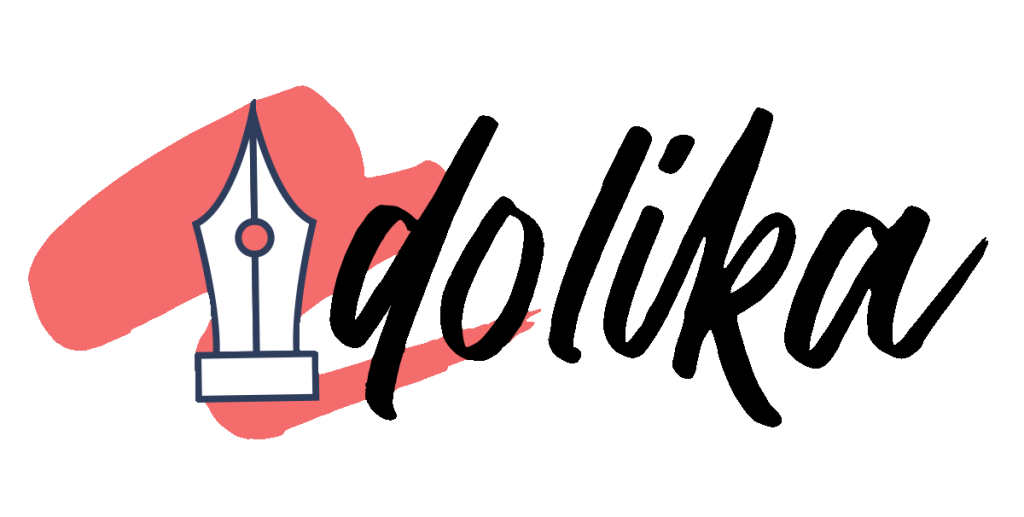What should writers expect when working with a literary editor, and why is it important to have one, in the first place, when publishing your book? As a writer, I have had the pleasure of working with Dr. Martin Egblewogbe, on my book, The Enemy of the State and other Stories (Dakpabli & Associates, 2022). My first book in the short story genre, it was an experience that taught me a lot about rigor, discipline, and adherence to the highest level of craftsmanship. It also taught me understand myself better as a writer and have confidence in my own creative voice.
This post’s idea came to me as I continue to work on a second short story collection. While I am nowhere near completion and still struggling with shaping my stories, I find myself often remembering Dr. Egblewogbe’s insights and suggestions. In this post, I was motivated by a desire to share some of his thoughts on the publishing business, and to provide useful tips on how working with a literary editor can improve the odds of having a successful book, and help grow one’s career as a writer. I am immensely thankful to Dr. Martin Egblewogbe for granting me this interview.

Q: Dr. Egblewogbe, thank you so much for taking time out of your busy schedule to do this interview. So, straight to our topic, then. Who is a literary editor?
A: A literary editor works with a writer to improve the script to the best possible version of itself. I think that a good way of looking at it is to correct and improve the manuscript.
Q: So, in general, what does it mean when you say to edit a manuscript?
A: A manuscript that is first prepared usually has errors in it. This has nothing to do with whether a person is a skillfully writer or not. Invariably there’ll be mistakes occurring at all sorts of levels. The editor will work at these different levels, from very basic ones like typographical errors to much higher-level problems like structural ones. The editor then works with the writer, to restructure the story to fit a certain desired result.
Q: So, in terms of publishing as a whole, what place does the literary editor actually occupy?
A: For traditional publishers, the editor is probably the single most important interface between the writer and the public. No traditional publisher would output a script based on what the writer had sent. The editor is the one who will more or less do the sign-off. So, the editor’s role is irreplaceable. Even if a writer is working on their own and self-publishing, they would still need an editor, for reasons we can explore as we go along.
Q: Does the literary editor have a specific set of tasks when they set out to edit? And are there any different types of editing that may be part of this processes?
A: I’m going to take this from a publisher’s perspective. A publisher may have a certain market in mind and they would want to make sure the story will match the market. The editor then, is going to structure the script to the market. Let’s take the example of someone writing for children. They may be marvelous stories, but the publisher being aware of the market may say that the words used in the manuscript are too complex for their target. The editor’s duty will then be to make sure those words are replaced by words that are easily understood by the market. The editor is the voice of the publisher in terms of the market, because ultimately any big publisher wants to sell a lot of books. In terms of the writing craft, editors are on the side of the writer. There usually are many gaps that occur in the process of writing, especially if it’s a lengthy book. Editors help the writer address any challenges in order to improve the book from a creative perspective. So, these are two main approaches.
Then there are also many different levels of editing. There are editors, who work to develop a script from ideas someone may have, and who wants to tell a story. At that point the person who initiates the idea can actually get an editor to develop it. You can also think of that as a kind of genre editor.
But usually when a work gets to a literary editor, the editor’s task is to have a more global view of the work, and assess its potential in terms of what it sets out to be. If it’s fiction, does it work as piece of fiction? If it’s a technical writing, is it of the appropriate standard? If the manuscript is an economics book, the editor is going to find out if it is indeed an economic book or whether it is literature pretending to be economics. At this level, an editor is looking out for content and the structure, and in the case of fiction, if it is effectively telling a story. And usually that is when there is a back and forth between the writer and the editor who may probe deeply into the story. For example, is the character well developed? If not, then in this case the editor may probe into that and discuss it with the writer.
After that stage, when the story is done, comes the next stage which deals with structure or order. An example of that could be the ordering of chapters. Finally, the editor and writer ultimately agree on a certificate script, which is passed on for copy editing.
The copy editor’s job is to go through and look out for typos and grammatical errors. Copy editing is done in all sort of different ways. Sometimes the manuscript is made available to selected readers, who may be paid say, ten dollars for finding a mistake. The readers have no interest in the story, no interest in the plot. All they’re doing is to look out for typographical errors. When the copy editing is done, the work is ready to go to press. There may be a few other sub levels to editing, but these are the broad types.
Q: In talking to many other fellow writers, I find that one of the main concerns that keeps popping up is how to keep the creative voice of their work intact when the work is under an editor’s scrutiny. This seems to be a source of stress for many writers. So, I want to ask you, when editing, how do you strategize your relationship with a writer to ensure that you help the writer maintain their voice?
A: Editors are aware that a writer’s work is not easily replicable. So, it is a question of having something and trying to make the writer agree that the work can be improved, and made better. an editor can’t write that work, because first of all, it’s not their story and many editors are not even writers to begin with. So, there is always a level of respect given to the writer’s work.
Most editors approach their work with an understanding that the manuscript is something someone is invested in; some works were being written for as long as for fifteen years, and either way represent someone’s deep emotional output. At the same time, the editor wouldn’t want the writer to put work out there, when it’s clear that things can be done to help the script.
When an editor does take on a writer’s work, it is always with a view to improve it. That can include asking for rewrites and asking for some sections to be removed, etc. and it is in those times that it can get very bitter.
I’ve worked with editors who don’t tell you kind things. If the editor is being really nasty you should go. But often enough, they’re not being nasty, they are just trying to improve your work.
Writers will sometimes pull their work and look for someone else. I mean, it happens in many cases. Several colleague writers with big publishers say that the editors don’t get their work. And some of them do have very good points about the editors not understanding what an author may be saying.
In many ways, the relationship with a literary editor may evolve into a kind of friendship. Some editors, you will be very good friends with, some you won’t – it’s really difficult to tell. There are many prominent Ghanaian books published outside where it worked, because the author said – this British editor does not understand this book. That led the authors to find someone else who understood them, and helped make a good name for them as authors.
There are also many, many others authors, who especially in subsequent novels, or books, will not let a book progress without working with a certain editor. And that is because, they come to see the value of the editorial work. It’s a very dicey game to play because there is always a very deep investment in the creative work by the writer.
It doesn’t always work well, you know. Sometimes there is a lot of friction, but then there are a lot of success stories too.
Q: True. So, knowing how important it is to having a good literary editor go through your work, how do you actually go about finding that good one in Ghana, for example? Any advice? Any red flags to watch out for, as well?
A: I think, in terms of looking for an editor, the first thing that the person should look out for is somebody who sees value in the work. Secondly, the editor shouldn’t be watering down their comments they may have. If they find mistakes, they should tell you. It is very, very important that an editor doesn’t gloss over your manuscript. Glossing over your manuscript does nothing to improve the work. I would even suggest that people should choose editors even if the editors don’t seem to be kind.
I’ve seen work come out that hasn’t been edited, yet when I look at the book, it says edited by “so, so and so”. The problem I find sometimes, is that the editor may have been overwhelmed by the stature of the writer. There are many local books by people of stature or public personalities, I’m not going to mention which ones, whose main problem is poor or non-existent editing. It is possible, that the editor was afraid to challenge the writer and make suggestions.
Then there’s the editor that takes an unnecessarily long time to edit a work. I have a friend who does editing for a prominent publisher. She says her desk is piled with manuscripts. But this is her job, and she has to go through them. People know she is an editor, and give her manuscripts, and even if she is willing to take them, she does negotiate for more time, which would be the right thing to do. Then there are editors who may not be interested in your work at all, and will accept it only to gloss over and get paid.
Q: How about editors? Do they have their own criteria for taking on someone’s manuscript?
A: Yes, they do, especially professional editors. Many of them have got to the stage where they see themselves more as part of creating a work of art. They may take the manuscript and the challenge that comes with it because it may be a beautiful story, or it may have other potential that appeals to them. For me, there are certain types of manuscripts I don’t feel qualified to do, especially children writing. I can’t tell what works well. I edit historical fiction, genre fiction and then some classes of non-fiction.
Q: From your experience as a literary editor, have you noted any specific challenges that Ghanaian writers seem to have, like language, structure, tone, theme? Are there any issues peculiar to writers in Ghana?
A: I don’t know if they are peculiar us because I don’t have too much experience outside, but I can mention some of the things that I commonly see. One of them is language, and there are two issues. One, the language is not natural – you’d find out that a writer is describing a scene but the way the language is used doesn’t match what they are describing. And it is not because they want to create a certain effect it’s simply because there are difficulties with language per se. Then the second thing that I have noticed, and this is especially the case with some younger writers, is that they do not take time to develop scene and settings. This is a common error for many new writers. They have a full setting they see in their mind, and they presume the reader can see it too. But the reader can’t, and if these descriptions are left blank, the reader will create descriptions in their minds based on their own experiences, and that may not be what the writer had in mind. I always ask writers to try and transmit their setting fully. This is usually a big difficulty, in addition to language.
And then I’ve also noticed that people are shy writing from their own experience, something I find odd. Instead of writing about things they have lived through, experienced in their life, and recognizable, for example, a Ghanaian walking down the street and eating waakye, I see writing that make it seem that it is a European who was looking at the scene. The end result feels like plastic – not real.
Another thing, is the way writers use our local languages, as if they are foreign and not our own. It’s true that we’re writing in English, but I think that if it’s a Ghanaian who is writing in English, the way the local language is infused into our English should be the same way we speak it. I also notice that many people struggle to bring in the “Twi” or the “Ga” into conversations. When I see such things, my thinking is, why don’t you write it the same way you speak with your colleagues?
The final thing that I have noticed is the way writers view of their audience, which is a problem for many writers. I often suggest to them to make their primary audience, the people they know, the people they talk to everyday. Just write for them, and if it is a very good story, it will travel by itself. You don’t really need to write for an American audience for your writing to reach America.
Q: Interesting! Then what about Ghana? In your opinion, what do Ghanaians want to read?
A: That’s very easy because we’ve seen several examples. The readership in Ghana likes Kokonsa so if the there is a Kokonsa book, the sales go through the roof. And it doesn’t matter whether the book is very well written of not, as long as it’s Kokonsa it sells. Publishers have realized this, and they are going for that sort of thing. A lot of the times it comes close, in a sense to the biography or autobiography, but sometimes you take look at a biography and find that it talks more about other people than about the person who wrote it.
Q: Kokonsa? Who would have thought! I just quickly would like to clarify the meaning of the word Kokonsa for our international readership. What is it as per your definition, and why do you think the Ghanaian readership is interested in it?
A: Kokonsa, really, is gossip. In the Ghanaian sense, however, it is more of a certain level of storytelling. So, it’s not just one line of gossip, but one that is fleshed out, with so much more in there – a full story.
Ghanaians like Kokonsa in general, and it is the sense of getting to know what other people lives are like as compared to yours. Kokonsa is that level of gossip that will extract a person’s full family history out of one single event. So maybe what draws the public is the idea of getting to know the salacious details about somebody’s life.
Q: Self-publishing is on the rise in Ghana, and doesn’t have the stigma it did a few decades ago. These days, many writers actually opt to self-publish their books. Where should such writers look, in their search for a good literary editor?
A: Most of the people whose work I edit, and I edit several books every year, come to me on recommendation from publishers. So, I would say, get in touch with publishers, and they may recommend an editor they use. That’s one way of doing it.
The second way is finding someone who has already been published, and ask them to recommend someone. The fact of the matter is that there are not that many literary editors in Ghana. At a point in time, they were not that many in Nigeria either, but what happened there is that the Nigerians identified the problem, and started actively training magazine and book editors. So, one can try talking to Nigerian publishers as well. There is an organization called Society for Book and Magazine Editors. They are a Nigerian organization linked with some publishers. I believe they have an online presence, so writers can contact them. I’m sure they’ll be able to provide good recommendations.
Q: Is there any reason why we don’t have enough of literary editors in Ghana, and what do you think could be done about this?
A: The reason I think is that, the Ghanaian publishing industry is not working well, so you’d even see that textbooks which you would expect to have the highest level of editing, haven’t even been edited. So, our publishing industry has many, many defects. One of the defects is a lack of editors. If our publishing industry was working efficiently, the demand for editors would have been recognized and provision made for their training. We have creative writing courses in many places in the country, but I don’t think they teach editing. The only other place I can think of where we can find editors would be in journalism, where they do editorial for news, and related content. When it comes specifically to literary editors, we need to provide more training.
Q: Martin, you are also a well-respected published author. How hard is it to be a writer of renown, and a literary editor at the same time. Do you feel that it’s a strength in term of literary editing or do you think that it presents a challenge?
A: I’ve really not thought about it because I operate in these two areas separately. When I’m writing my own stories, I think typically as just a writer. Usually, I would leave my stuff for several months, then look at it again before sending it to somebody else to read. So, in terms of the writing I don’t look at the editing part, I don’t even think of myself as an editor at that time. But when it comes to editing other people’s work, I think that my writing background becomes an asset. I begin to think, what if I were writing this story, or I try to put myself in the writer’s place. I think I’m sympathetic to how the writing process would go because I’m a writer myself.
Q: Is there any general advice that you’d give to encourage writers in Ghana to seek out literary editors?
A: The benefit of a second eye is extremely important. You can’t underrate that – it’s for quality control. If you do not get the editor to look at your work and correct mistakes, you’ll get the readers to do that, and they will be much less sympathetic.
The next thing is that writers shouldn’t be in a hurry, especially when they feel that their story is important. If it’s important it’ll stand the test of time. So, for those who are like, “oh, I just finished writing it”, I typically say that while it’s good to speed up the process, its equally good to be patient. I say this because I’m now old, and I remember when I was much younger, when I wrote something I’d want it out as quickly as possible. Now, I’ve been sitting on a script for like fifteen years. I’ve finished it, and I’m not too worried about it.

Martin Egblewogbe is the author of the collection of short stories, The Waiting (Lubin & Kleyner, 2020) and Mr Happy and The Hammer of God and other Stories (Ayebia, 2012). His writing has appeared in a number of collections, such as The Gonjon Pin (2014 Caine Prize anthology), PEN America’s Passages Africa (2015), All The Good Things Around Us (Ayebia, 2016), Litro #162: Literary Highlife (2017), Between The Generations (2020), and Shimmering At Sunset (2021). Martin was the commissioning editor for the anthology Resilience: A Collection (2021), and also co-edited the anthology of short stories, The Sea Has Drowned the Fish (2018) as well as the anthologies of poetry Look where you have gone to sit (Woeli, 2010) and According to Sources (Woeli, 2015). He is a co-founder and a director of the Writers Project of Ghana, and director of Pa Gya! A Literary Festival in Accra. He also hosts the radio show, Writers Project on Citi FM.MM
Follow the Writers Project Ghana, and the Pa Gya Literary Festival on Instagram for more.





